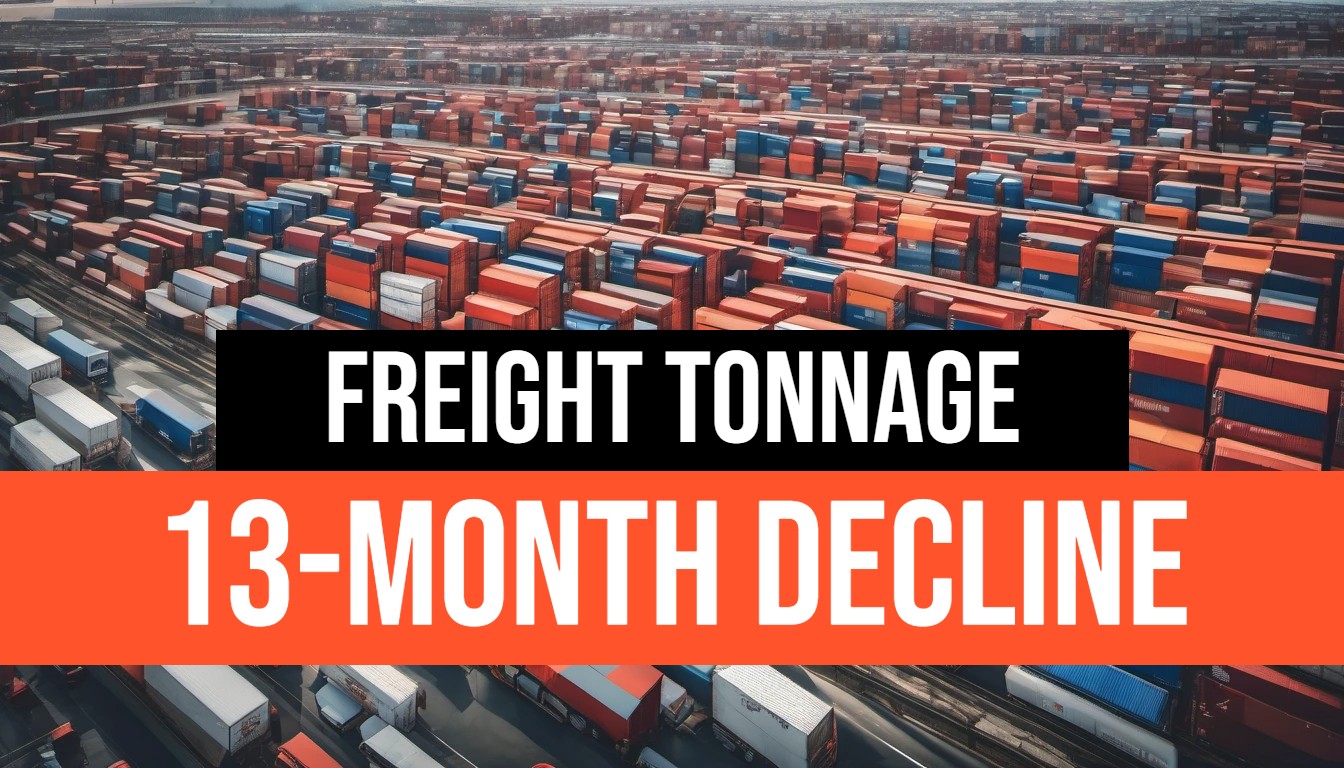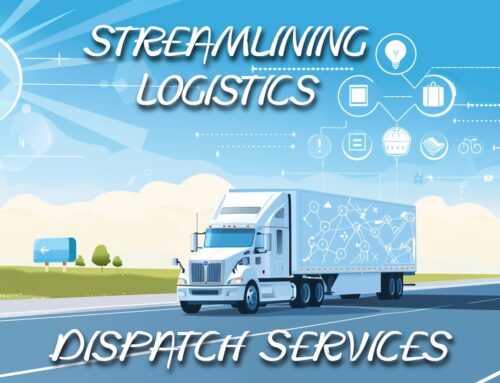Table of Contents
The trucking industry is the backbone of the American economy, responsible for transporting a staggering 72.5% of all domestic freight by weight according to the American Trucking Associations (ATA). However, for the past 13 months, a crucial indicator of the industry’s health – freight tonnage – has been on a concerning downward trend. This article dives deep into the significance of freight tonnage, analyzes the current slump, and explores the implications for trucking companies, carriers, and owner-operators.
What is Freight Tonnage?
Freight tonnage refers to the total weight of goods shipped by truck. It’s a vital metric that reflects the overall demand for trucking services. Simply put, more tonnage signifies a booming freight market with businesses shipping a higher volume of goods. Conversely, declining tonnage indicates a slowdown in economic activity, leading to fewer shipments and potentially impacting the trucking industry.
The trucking industry is often referred to as the “canary in the coal mine” for the broader economy. This analogy highlights how the trucking sector tends to be one of the first industries to experience the effects of economic fluctuations. A decline in freight tonnage can serve as an early warning sign of a potential economic slowdown, providing valuable insights for truckers to navigate these challenging periods.
A 13-Month Slump: Breaking Down the Data
The current freight tonnage slump began in March 2023 and has continued unabated for 13 consecutive months. Here’s a closer look at the data provided by the ATA’s For-Hire Truck Tonnage Index:
- January 2024: Compared to January 2023, tonnage declined by a significant 4.7%. Additionally, there was a 3.5% decrease compared to December 2023.
- February 2024: A glimmer of hope emerged with a 4.3% increase in tonnage compared to January 2024. However, it was still down 1.4% year-over-year (YoY) compared to February 2023.
- March 2024: The downward trend resumed in March, with freight tonnage dipping 1% YoY compared to March 2023. Even more concerning is the 2% decrease compared to February 2024.
While the data shows some volatility, the overall trend is undeniable – freight tonnage is down. This raises critical questions for truckers: What are the reasons behind this slump, and how will it impact the industry?
The Reasons Behind the Freight Tonnage Slump
The current freight tonnage decline can be attributed to a confluence of factors, including:
- Global Economic Slowdown: Concerns about a global economic slowdown are impacting businesses, leading them to reduce inventory levels and consequently, freight shipments.
- Inflation and Rising Costs: The ongoing inflation and rising fuel costs are putting a strain on businesses and consumers alike, potentially leading to decreased consumer spending and ultimately, lower freight demand.
- Supply Chain Disruptions: Lingering supply chain disruptions continue to pose challenges, with businesses facing difficulties in obtaining raw materials and finished goods, impacting freight movement.
- Inventory Normalization: Following a period of pandemic-driven stockpiling, businesses are now focused on normalizing inventory levels, leading to a temporary dip in freight demand.
These factors have created a complex situation for the trucking industry. While the long-term outlook remains uncertain, understanding the reasons behind the freight tonnage slump allows truckers to make informed decisions and adapt their strategies.
The Impact of Declining Freight Tonnage on Truckers
 The decline in freight tonnage presents several challenges for truckers:
The decline in freight tonnage presents several challenges for truckers:
- Decreased Rates: With fewer loads available, competition among truckers intensifies, potentially driving down freight rates. Truckers may need to negotiate more aggressively to secure profitable loads.
- Increased Competition: As freight demand shrinks, the competition for available loads becomes fiercer. Truckers may need to consider expanding their service offerings or specializing in niche markets to remain competitive.
- Route Optimization: Careful route planning and optimization become even more crucial during a downturn. Utilizing efficient routes that minimize deadhead miles (empty miles driven) can help truckers maximize their profitability.
Additional Stats to Consider
- According to the Cass Freight Index, a measure of national shipment volumes, there has been a 3.6% YoY decline in the number of shipments in March 2024. This further reinforces the decline in freight demand.
While freight tonnage is down, interestingly, the Logistics Management Institute (LMI) reported that transportation prices have actually increased for the past three months, following 18 consecutive months of decline [3]. This seemingly contradictory trend can be explained by a few factors:
- Carrier Capacity Reduction: The prolonged period of declining freight rates may have led some carriers to exit the market or reduce their capacity. This decrease in overall trucking capacity can contribute to price increases even with lower demand, as there are fewer trucks available to haul the freight.
- Rising Operating Costs: The significant increase in fuel costs and other operating expenses like insurance and maintenance puts pressure on carriers to raise their rates to maintain profitability. Even with fewer loads, they may need to charge more per load to cover their rising costs.
- Shifting Market Dynamics: The decline in tonnage might be disproportionately affecting specific types of freight or lanes. In contrast, other segments of the market with higher demand or specialized requirements might see stronger pricing due to tighter capacity or unique service needs.
It’s important for truckers to stay informed about these market dynamics and track freight rate trends in their specific hauling segments. This knowledge allows them to adjust their pricing strategies and negotiate more effectively to secure profitable loads.
How To Navigate the Freight Tonnage Slump

The current freight tonnage slump presents challenges, but there are also opportunities for truckers who can adapt and strategize effectively. Here are some tips:
- Focus on Efficiency: Optimizing routes to minimize deadhead miles and fuel consumption is crucial during a downturn. Utilizing technologies like load boards and route planning software can help truckers find the most efficient routes and maximize their earning potential per mile driven.
- Embrace Flexibility: Be open to hauling different types of freight or expanding your service offerings to cater to a broader range of customer needs. This flexibility can help truckers secure more loads and weather the downturn.
- Develop Strong Carrier Relationships: Building strong relationships with reliable carriers can provide access to a steady stream of loads and potentially more favorable rates.
- Stay Informed: Regularly monitor freight tonnage data, industry trends, and economic forecasts to stay ahead of the curve. This knowledge allows truckers to anticipate changes in the market and adjust their strategies accordingly.
We Help Truckers Navigate Freight Tonnage Declines
At AFT Dispatch, we understand the challenges faced by truckers in today’s ever-changing market environment. Our experienced dispatchers can help you find the best possible loads, negotiate competitive rates, and optimize your routes for maximum efficiency. We offer a range of services designed to streamline your operations and increase your profitability, including:
- Dedicated Dispatch Services: Our team of experienced dispatchers will work tirelessly to find you high-paying loads that match your preferences and equipment.
- Route Optimization: Our dispatchers utilize advanced technology to plan efficient routes that minimize deadhead miles and maximize your earning potential.
- Market Analysis and Guidance: We stay current on industry trends and freight market conditions, providing you with valuable insights to make informed decisions.
By partnering with AFT Dispatch, you can gain a competitive edge in the market and navigate the current freight tonnage slump with greater confidence.
Ready to take control of your trucking business and maximize your profits?
Fill out our short form today to learn more about how AFT Dispatch can help
. You can also call us anytime at (801) 448-6363 or visit our website to explore our vast library of free educational trucking videos. Don’t miss out on this opportunity to take your trucking business to the next level!





Leave A Comment